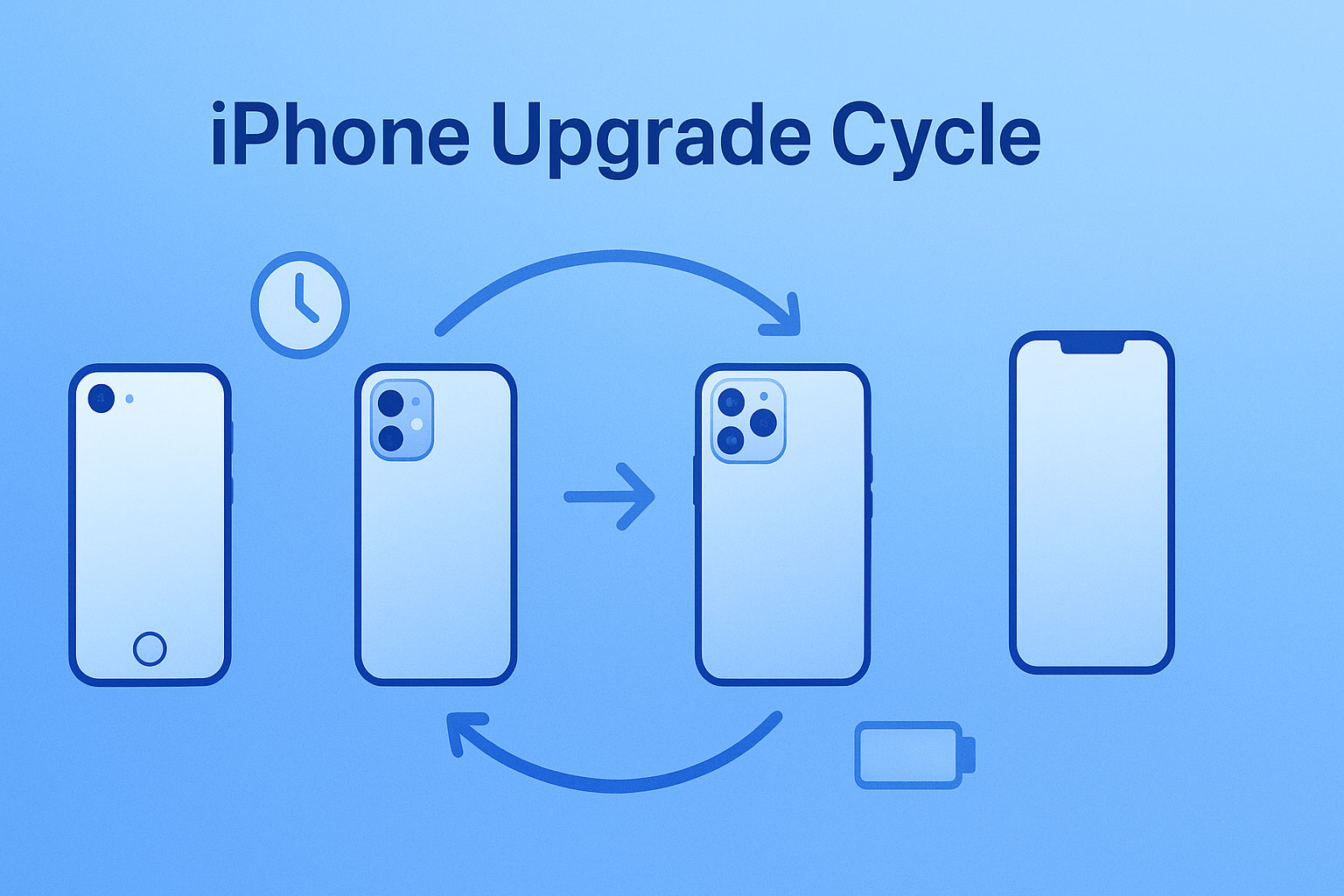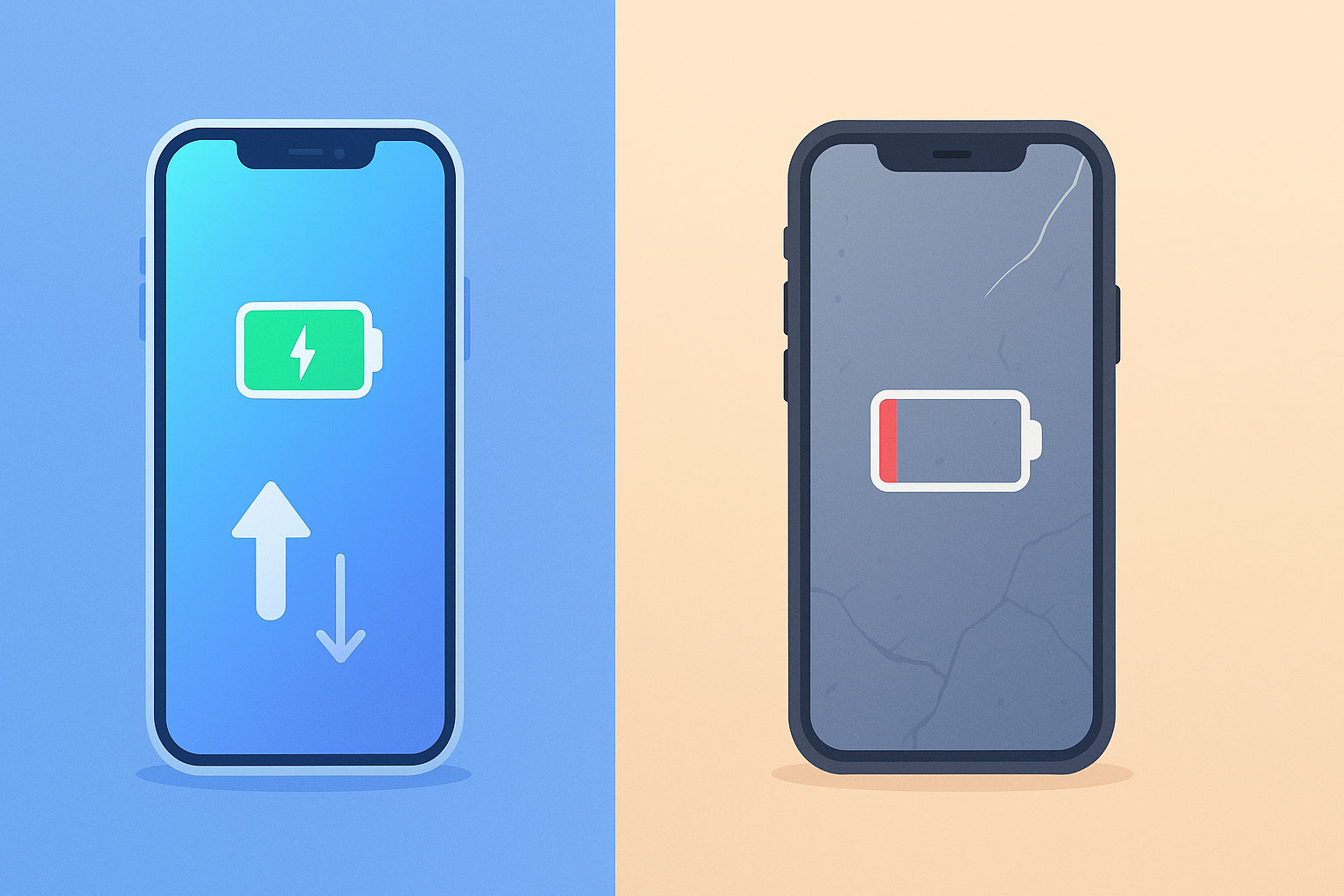The iPhone is the most widely used mobile phone in the world. Apple introduces new models to the market every year, and each model features more capabilities and storage than its predecessor. So it is quite normal for this question to come to your mind about how many times and when you should upgrade your iPhone.
The iPhone never forgets the important aspects like new advanced features and security with every new model of its smartphones. Especially in this era of advanced technology, where phishing and hacking have become very easy, it is better to upgrade your mobile phone. But some people, instead of upgrading their iPhone, prefer old iPhones. They are better but not the best.
In this post, we will look at all the aspects and decide whether we get any benefit from the iPhone upgrade or if it is just a waste of our money. Apart from this, we will see how many times and when each person should upgrade their iPhone, which is better for them.
When to Consider Upgrading
It is challenging to determine how often you should upgrade your iPhone, but I would like to mention some key points to help you estimate whether it’s time to replace your iPhone with a newer model
Key Signs It’s Time to Upgrade
Here are some of the most common reasons people choose to upgrade their iPhone:
1. Your Battery Doesn’t Last the Day
If your iPhone’s battery issues are bothering you and it doesn’t last for at least 24 hours, then you may need to consider replacing your iPhone. Every model of iPhone has a battery health indicator, which is present in the iPhone settings. Through this, you can guess the health of the iPhone’s battery. Here you can also get your iPhone’s battery replaced, but this is not at all preferable.
2. You Can’t Install the Latest iOS
Each year, Apple drops support for older iPhones. If your current device can’t run the latest iOS, you’re missing out on new features, performance improvements, and most importantly, security updates. This is the most important point for upgrading your iPhone.
3. Performance Has Slowed Down Noticeably
4. Camera Quality No Longer Meets Your Needs
5. You’re Out of Storage
6. You’ve Damaged Your Current iPhone

iPhone Upgrade Cycle
To know how often you should upgrade your iPhone, you need to know how Apple releases new products. It’s easy to know when to buy and when to wait because Apple has a pretty set schedule.
Annual iPhone Release Pattern
Every year in September, Apple usually comes out with new iPhones. These come in different levels, like base models (iPhone 14, iPhone 15) and premium models (iPhone 15 Pro, Pro Max). These upgrades can be small one year and big the next, which is why they are often called a “tick-tock” upgrade cycle:
| Year | Typical Upgrade Type | Example |
|---|---|---|
| Year 1 | Major Design/Hardware Change | iPhone 12 (5G, new design) |
| Year 2 | Performance/Feature Tweaks | iPhone 13 (better battery, camera) |
| Year 3 | Major Overhaul Again | iPhone 14 Pro (Dynamic Island, A16 chip) |
iPhone Models & Lifespan
Apple gives software updates to its devices for 5 to 6 years, which makes iPhones some of the most durable smartphones available. This is a rough idea of how long each generation of iPhone stays useful:
| iPhone Age | Status | Recommendation |
|---|---|---|
| 1–2 years | Latest features, fast performance | No upgrade needed unless desired |
| 2–3 years | Slightly outdated, still good | Consider upgrading for new tech |
| 4+ years | Limited support, slow performance | Upgrade recommended |
Upgrade Cycle Options
Depending on your preferences and lifestyle, you might fall into one of the following upgrade habits:
Every Year
- Ideal for tech enthusiasts or early adopters
- It’s best if you use Apple’s iPhone Upgrade Program
- Higher cost, but you always get the latest features
Every 2–3 Years
- The most common upgrade cycle for average users
- Waits for meaningful feature upgrades
- Balanced in terms of value and performance
Every 4+ Years
- Best for budget-conscious or eco-minded users
- Maximize the value of your investment
- Likely to experience performance or compatibility issues after 4 years
The most important thing to keep in mind when deciding how often to upgrade your iPhone is to time your upgrades with Apple’s release cycle and your own needs. Most people don’t need to upgrade every 2–3 years unless they’re looking for the newest technology.

Short-Term vs Long-Term Ownership
It can help to weigh the pros and cons of owning an iPhone for a short time versus a long time when deciding how often to upgrade it. How you go about it depends on whether you care more about keeping up with the latest technology or getting the most out of your purchase.
Short-Term Ownership (Upgrading Every 1–2 Years)
This choice is good for people who like to be on the cutting edge or who use their iPhone a lot for work, photography, or creative tasks.
Pros:
- Access to the latest features and design upgrades
- Higher resale value when trading in a newer device
- Often covered by AppleCare+ or warranty
- Best performance and camera capabilities
Cons:
- More expensive over time
- Environmental impact from frequent device changes
- Small year-over-year changes may not justify the cost
Long-Term Ownership (Upgrading Every 3–5+ Years)
Many people say that iPhones still work and are useful long after three years, especially because Apple supports iOS for a long time.
Pros:
- Lower overall cost (maximize value per dollar)
- Fewer upgrade hassles and data transfers
- Less electronic waste and more eco-friendly
Cons:
- Slower performance and outdated features over time
- Battery degradation may require service
- Potential lack of support for new apps or accessories
| Feature | Short-Term (1–2 years) | Long-Term (3–5+ years) |
|---|---|---|
| Cost | Higher overall | More cost-effective |
| Resale Value | High | Low |
| Battery Life | Usually excellent | Degrades over time |
| iOS Compatibility | Always updated | May lose support |
| Environmental Impact | Higher | Lower |
| Performance | Best available | Slower over time |
When It Doesn’t Make Sense to Upgrade
Every year, Apple comes out with new iPhones, which can make you want to upgrade just because it’s what everyone else is doing. But in a lot of cases, it might not be necessary or even smart to upgrade. It’s just as important to know when it’s not worth it to upgrade as it is to know how often you should upgrade your iPhone.
Minor Improvements Over Previous Model
Not every new iPhone has upgrades that change the game. In fact, a lot of changes from year to year are small, like better cameras, a new chip, or small design changes.
Stick with your current iPhone if:
- It already has Face ID or Dynamic Island (from recent models)
- Battery life is still strong
- iOS and apps run smoothly
- Camera quality is more than adequate for your needs
Budget Constraints
iPhones are high-end devices, and the newest models can cost more than $1,000. It’s worth asking if the benefits are worth the cost if upgrading is hard on your budget.
You’re Already in a Recent Upgrade Cycle
If you bought an iPhone in the last 12 to 18 months or are in Apple’s Upgrade Program, it might not be worth it to upgrade again. It also means you have to spend more time moving data, resetting devices, and learning about new features that might not make a big difference in how you use them.
Environmental Impact Matters to You
Every smartphone that is made and thrown away adds to e-waste. If you care about the environment, keeping your device for longer lowers your carbon footprint.
You Don’t Use Advanced Features
If you mostly use your iPhone for simple things like calling, texting, browsing, and social media, new features like ProMotion displays or lidar scanning probably won’t make your experience much better.
You probably don’t need to upgrade if:
- You don’t use the camera professionally
- You don’t game or edit on your phone
- You don’t need the latest connectivity (like 5G if you’re still in a 4G area)
There’s no need to rush to upgrade if your current iPhone still works well, gets software updates, and meets your daily needs. In fact, waiting to buy something next may be the smarter and more responsible choice.
Sometimes, the best answer to how often you should upgrade your iPhone is “Not yet.”
Real-World User Scenarios
It’s not just about the features when you decide how often to upgrade your iPhone; it’s also about you. Your habits, what you care about, and how you use it all matter a lot. Here are some real-world examples of how different people use their iPhones and when they plan to upgrade to help you make your choice.
1. The Content Creator
Upgrade Cycle: Every 1 Year
A travel vlogger, photographer, or social media influencer depends heavily on camera quality, performance, and display accuracy.
Why Upgrade Often?
- Needs the latest camera system (e.g., cinematic mode, better low light)
- Wants cutting-edge tools for video editing and AR content
- Often uses the phone professionally, so it’s a business investment
2. The Busy Professional
Upgrade Cycle: Every 2–3 Years
This user relies on their iPhone for scheduling, calls, emails, multitasking, and remote work.
Why Wait a Bit Longer?
- Doesn’t need the newest features immediately
- Prioritizes performance and reliability
- Will upgrade once noticeable slowdowns or app issues occur
3. The Everyday User
Upgrade Cycle: Every 3–4 Years
Someone who uses their phone for browsing, texting, social media, YouTube, and casual photography.
Why Hold On Longer?
- Satisfied with decent performance and photo quality
- Doesn’t notice or care about small yearly upgrades
- Would rather spend less and get the most out of each purchase
4. The Budget-Conscious Buyer
Upgrade Cycle: Every 4–5+ Years
This user is cost-focused and values longevity over trends. They might buy older models, refurbished iPhones, or hand-me-downs.
Why Stretch the Lifespan?
- Doesn’t need flagship features
- Stays within budget by skipping multiple upgrade cycles
- May use devices even after Apple stops iOS support
5. The Eco-Conscious Minimalist
Upgrade Cycle: Every 4+ Years
This user is driven by sustainability and reducing e-waste.
Why Rarely Upgrade?
- Cares about environmental impact
- Buys once, maintains well, and only upgrades when necessary
- Chooses devices with repairability and long-term software support
There’s no single rule for how often you should upgrade your iPhone, but knowing what kind of user you are can help you make a smarter, more personal decision.
Conclusion
So, how frequently should you update your iPhone? The answer is obvious: you need to examine how you use it. Each person has a usage history, so you must determine whether or not you need to upgrade your iPhone based on your usage.
It is more responsible to upgrade your iPhone every three to four years if it still supports the most recent version of iOS, meets your basic needs, and you have no issues. However, if you use your iPhone excessively and it is used for work-related tasks every day, you should upgrade it every one to two years.
After all, it should be up to you whether or not to upgrade your iPhone. Is an iPhone upgrade necessary? Is the condition of your iPhone poor, or is it too old? Does it run the most recent apps, have the most recent iOS, or hang frequently? After considering all of these factors, determine if you should upgrade your iPhone.
The key to smart upgrades is smart timing.

